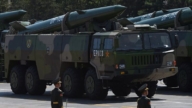【新唐人2012年8月11日訊】法國歷史學家阿歷克西•德•託克維爾(Alexis de Tocqueville)所寫的《舊制度與大革命》,被公認是研究「法國大革命」的一部經典之作。這本書近期在北京城被知識份子、甚至中南海的領導人熱烈討論,香港媒體透露,中共國務院副總理王歧山憂心中國現代化轉型,不會順利,稍有不慎,甚至會引發「大革命」。
托克維爾的名言:「民主擴展個人自由的範圍,而社會主義卻對其加以限制;民主盡可能的賦予每一個人價值,而社會主義僅僅使每一個人成為一個工具、一個數字。民主是為了自由而追求平等,社會主義則是為了壓迫和奴役,而追求平等。」
托克維爾認為,各階級之間的緊張關係之所以加劇,主要是「中央集權制」的作用。據了解,法國在大革命前,已形成與歐洲其他國家無法比擬的「中央集權」的政治體制:也就是集行政、立法和司法權於一身的統一權力機構。
托克維爾在《舊制度與大革命》一書中發現,歷史上的大革命,也就是暴力革命並非發生在貧窮時期,而是發生在經濟上升並帶來社會兩極分化之後。因為在這種歷史時刻,階級矛盾激化,社會底層的民眾特別容易把憤懣轉變為戰火。
比較「法國大革命」當時的社會背景,與現今的中國社會狀況,有學者指出,實在是太像了!
原「北京大學」法律系講師王天成:「因為這些年來,尤其是最近,改革的呼聲高漲,但實際上他們有一個用意,就是說,你看我們還是不要改,一改反而更危險,一改的話可能會加快我們的崩潰,加快崩潰,社會控制不住,他們抱著這麼一個觀點看,這個觀點是成問題的。」
原「北京大學」法律系講師王天成認為,一個專制政府如果他拒絕改革,那他就是抗拒變化的潮流,那人們的自由就沒有了希望,但是現實情況是,現在世界上有五分之三的獨立國家變成了民主國家,這些國家很多都是靠民眾的抗議,如果專制政權拒絕改革,就會像最近兩年發生在突尼斯和埃及等國家的「茉莉花革命」一樣。
王天成:「實際上你一定要認識到,你不改也是危險的,你不改也可能被推翻,當然你要改的話,就是如果你的戰備、你的策略不對,你這個節奏、速度不對,你的目標不對,那你也有可能被推翻。」
王天成建議中共當局進行真正的民主轉型,他說,真誠的啟動這方面的改革,取得民眾的信任,還有可能成功,如果慢慢吞吞,應付一下輿論,時間拖長,那政權很可能會被推翻。
王天成:「你以為你拒絕改革你就可以阻擋歷史前進的步伐,那就錯了,我們看到很多的專制政府,在一夜之間就崩潰了,一夜之間崩潰了!人民群眾的抗議,就把它給推翻了,變成癱瘓,這種事情歷史上見多了。」
香港《新維月刊》報導,消息人士透露,中共國務院副總理王岐山對當今中國憂心仲仲。「他認為,中國這樣在世界上舉足輕重的大國,從歷史上看也好,今天的外部環境也好,現代化轉型不會那麼順利。中國人自己的代價也沒有付夠。」
去年12月,香港《北運河出版社》出版的新書《十八大總理爭奪戰》中提到,王岐山也有自己的「死穴」。王岐山的「死穴」就是他所分管的金融系統出現了危機,而他難逃責任。
在此之前,《路透社》報導,王岐山曾在兩會上透露自己「想修改刑法」,並大談法治建設和人大立法工作。
採訪/秦雪 編輯/周平 後製/廣德
‘Old Regime and the Revolution’: Chinese Vice Premier Wang Qishan Concerned.
French historian Alexis de Tocquevilles “Old Regime
and the Revolution is widely acknowledged as a classical study of the French Revolution.
This work is being discussed heatedly by Beijing scholars.
Hong Kong media revealed that Wang Qishan, Chinese
Communist Party (CCP) Vice Premier is concerned about the modern China in transition.
If something does not go smoothly, and there
is carelessness would, it will cause a great revolution.
Tocqueville famously states, “Democracy extends
the sphere of individual freedom, socialism restricts it.
Democracy attaches all possible value to each man,
socialism makes each man a mere agent, a mere number.
Democracy and socialism have nothing
in common but one word: equality.
But notice the difference: while democracy seeks equality
in liberty, socialism seeks equality in restraint and servitude.”
Tocqueville believes the reason relationships between social
classes intensifies is due mainly to a centralized power.
According to this understanding, before the French
Revolution, France took on a centralized system incomparable to any other European country.
This placed executive, legislative and judicial
powers in a centralized authority.
The work “Old Regime and the Revolution” says that
great revolutions that have happened historically,
such as violent revolutions,
did not occur during a time of poverty.
They occurred when economic situations
brought polarization to society.
This is because at times like these,
conflict between social classes are incited.
It is easy for those at the bottom classes of the society
to turn their flames of their anger into flames of war.
Some scholars point out that the social background
at the time of French Revolution is very similar to the current conditions in China today.
Wang Tiancheng, Former Beijing University Law Professor:
“During these past few years, especially recently,
the call for revolution is becoming louder.
In reality, however, they have an intention,
which is not to change.
Once it becomes change, it will be more dangerous.
Change may speed up the collapse and
the society cannot control it.
They hold this perspective.
This is a problematic perspective.”
Wang also believes that if a dictatorial government refuses
revolution, then it is resisting the trend of change.
There is then no hope for people’s freedom.
But the reality is now many dictatorial countries
have become democratic countries.
This was largely due to popular protests.
If a dictatorial regime refuses a revolution, then
things like the Jasmine revolution will take place.
Wang Tiancheng: “In reality you have to realize that not
changing is also dangerous. You can also be overthrown.
If your strategies are not right, if your rhythm and speed
is not right, if your goals are not right, then you also face the possibility of being overthrown.”
Wang suggests the CCP should
truly start a democratic change.
He thinks that sincerely initiating a change
in this regard will gain the trust of people.
It also faces the possibility of a success.
If they are slow or don’t take public opinion seriously,
dragging out the time, then it is very possible the regime will be overthrown.
Wang Tiancheng: “Thinking that a refusal to change
can hinder the steps of history is wrong.
We saw a lot of dictatorial regimes collapse overnight,
and it collapses in just one night.
People』s protests overthrow it and paralyze it.
We』ve seen many things like this historically.”
Hong Kong』s Xinweiyuekan reported that CCP Vice Premier
Wang Qishan is very concerned about today’s China.
He thinks that as a large country,
which plays a decisive role in the world,
whether from a historical perspective or from the current
global environment today, China’s modern transformation will not be so smooth.
And Chinese people still have a long way to go.
In December last year, Hong Kong’s Beiyunhe Publishing
Incorporation’s new book “18th Battle of the Premiers”
mentioned that Wang Qishan also has his own “death point”.
His “death point” is that danger is surfacing within
the financial system that he is in charge of.
It would be hard for him to escape responsibility.
Prior to this, Reuters reported Wang disclosed
he wanted to amend China’s Criminal Law.
He spoke extensively on legislative construction
and the works related to enacting laws.




























